Greetings fellow rabbit enthusiasts! Today, I want to dive deep into the topic of why rabbits shake. As rabbit owners, it’s important for us to understand the reasons behind this behavior so that we can provide the best care and address any potential health concerns.
From subtle trembling to violent convulsions, there are various types of shaking in rabbits. While some shaking is perfectly normal and harmless, others may indicate underlying health issues that require immediate attention. Let’s explore the different types, causes, symptoms, and treatments of rabbit shaking to ensure our furry friends live happy and healthy lives.
Key Takeaways:
- Why rabbits shake can vary from normal behaviors to serious health issues.
- Understanding the different types of shaking in rabbits is crucial to assess their well-being.
- Some shaking behaviors, such as trembling and rippling skin, are considered normal and harmless.
- Convulsing and other abnormal shaking require immediate veterinary attention.
- By monitoring and addressing the causes of rabbit shaking, we can ensure their overall health and happiness.
Types of Shaking in Rabbits: Trembling, Rippling Skin, Twitching, and Convulsing
When it comes to shaking in rabbits, there are different types of behaviors to consider. Understanding these types can help rabbit owners determine whether the shaking is normal or indicative of an underlying health issue. The four main types of shaking in rabbits are trembling, rippling skin, twitching, and convulsing.
Trembling: Trembling is a subtle kind of vibrating that is considered a normal behavior in rabbits. It often occurs when a rabbit is excited, scared, or adjusting to a new environment. This type of shaking is typically temporary and should not be a cause for concern.
Rippling Skin: Rabbits have a unique ability to make their skin ripple. This is a natural response to changes in the environment, such as air currents. The rippling of the skin helps regulate their body temperature. It is a normal behavior and does not require any intervention.
Twitching: Twitching in rabbits includes little shakes of the head and feet, as well as flopping on the floor. This behavior is often seen when rabbits are relaxed and content. It is their way of showing happiness and satisfaction. Twitching is a normal behavior and should not be a cause for concern.
Convulsing: Unlike the other types of shaking, convulsing is a violent shaking that requires immediate veterinary attention. Convulsions in rabbits can be a sign of a serious health issue or seizure activity. If a rabbit is convulsing, it is important to seek professional help as soon as possible to determine the cause and provide appropriate treatment.
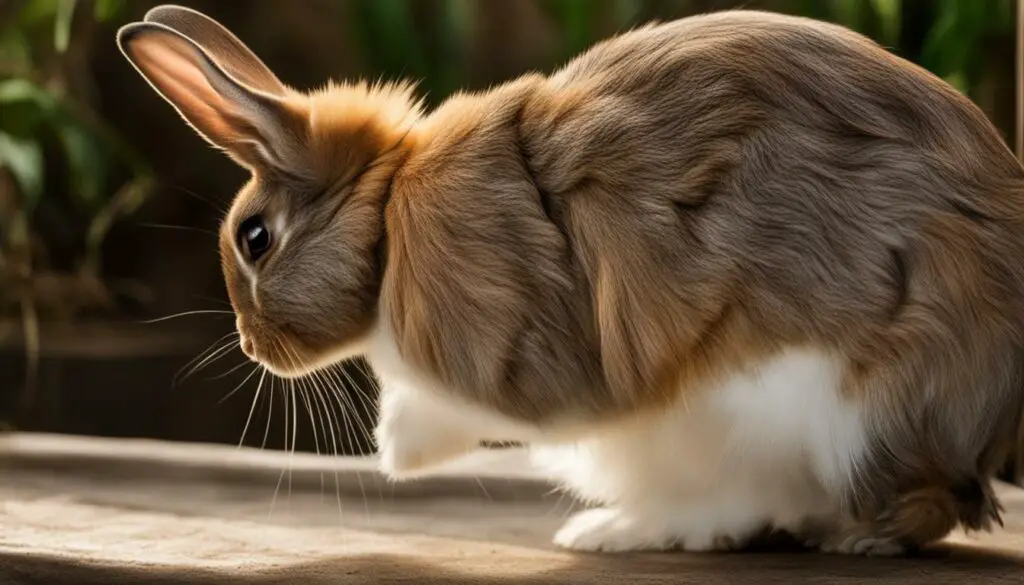
Trembling vs. Convulsing
| Type of Shaking | Normal Behavior | Concerning Behavior |
|---|---|---|
| Trembling | Excitement, fear, adjustment to new environment | N/A |
| Convulsing | N/A | Possible serious health issue or seizure activity |
Understanding the different types of shaking in rabbits can help owners recognize when their furry friends are exhibiting normal behaviors or when they may be experiencing potential health issues. It’s always important to monitor a rabbit’s shaking behavior and seek veterinary attention when there are concerning signs, such as convulsions.
Normal Reasons Why Rabbits Shake: Sleep Twitches, Happy Shakes, and Hiccuping
When it comes to understanding why rabbits shake, it’s important to note that not all shaking is a cause for concern. In fact, there are several normal reasons why rabbits may shake, including sleep twitches, happy shakes, and even hiccuping.
Sleep twitches are a common occurrence in rabbits. Just like humans, rabbits can experience muscle twitches and limb movements while they’re asleep. You may notice their feet twitching and their limbs shaking slightly. This is completely normal behavior and nothing to worry about. It’s just their body’s way of releasing tension and processing their dreams.
Another reason why rabbits shake is when they’re feeling happy and excited. Rabbits can show their joy by shaking their body. You may observe this behavior when they first see you, during playtime or when they’re anticipating mealtime. It’s their way of expressing their happiness and enthusiasm for your presence or an upcoming activity. It’s a heartwarming sight to see and a sign that your rabbit is content.
Lastly, hiccuping is also a normal occurrence in rabbits, particularly in young kits. Hiccuping happens when the diaphragm, a muscle responsible for breathing, contracts involuntarily. While it may seem unusual, it’s harmless and usually goes away on its own. You can gently stroke your rabbit’s back or distract them with some playtime to help relieve the hiccups.
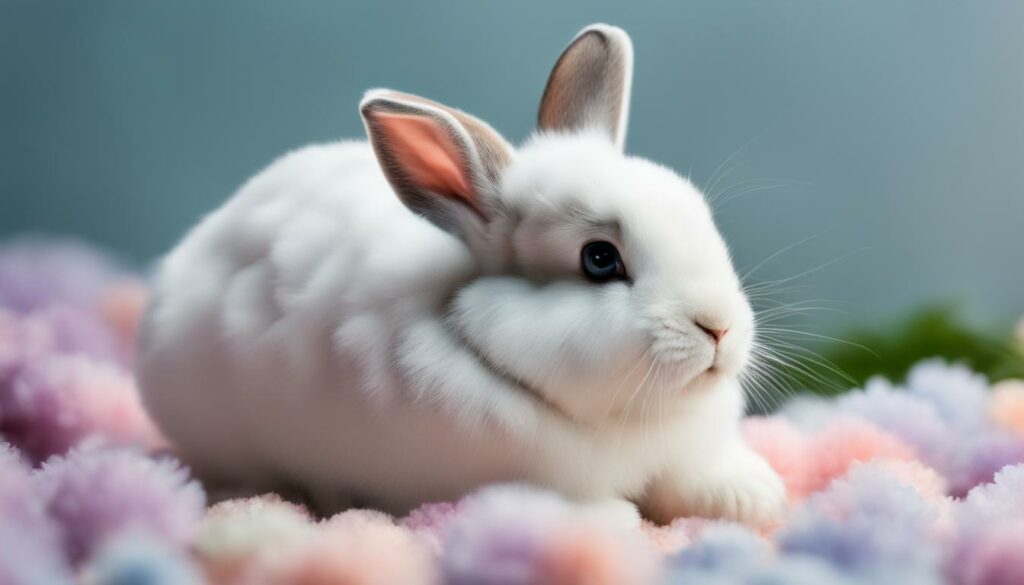
Understanding these normal reasons for rabbit shaking can help put your mind at ease. If your rabbit is showing sleep twitches, happy shakes, or even hiccuping, there’s typically no cause for concern. However, it’s important to keep an eye out for any other accompanying symptoms or changes in behavior, as these could be indicators of other health issues. Providing a safe and comfortable environment for your furry friend will ensure their well-being and happiness.
Reasons Why Rabbits Shake Due to Fear and Startling
Rabbits, being prey animals, are naturally sensitive to their environment and can easily become fearful or startled by sudden loud noises or movements. This fear-induced shaking is a common response in rabbits and is accompanied by fast and erratic breathing, a stiffened body, and ears that are held upright and tense. It’s important to understand the reasons behind this behavior to provide the necessary care and reassurance for your rabbit.
One of the main reasons why rabbits shake due to fear is their instinctual response to potential danger. When they perceive a threat, such as a sudden loud noise or a predator-like movement, their natural survival instincts kick in, causing their body to shake. This shaking serves as a way for rabbits to release tension and prepare for a fight-or-flight response.
Another reason why rabbits may shake from fear is their desire to find a secure hiding place. When they feel frightened or threatened, rabbits will often seek out a safe and secluded spot where they can feel protected. The shaking behavior may continue until they find a suitable hiding place or until they feel safe in their environment again.
Signs of Fear and Startling in Rabbits
- Fast and erratic breathing
- Stiffened body and tense ears
- Shaking or trembling
- Attempting to find a secure hiding place
It’s important to remember that fear-induced shaking in rabbits is a natural response and will typically subside once they feel safe or have found a secure hiding place. As a rabbit owner, your role is to create a calm and peaceful environment for your pet, minimizing potential triggers that may cause fear or startle them. By providing a safe space and gently reassuring your rabbit during times of distress, you can help them feel more secure and reduce instances of shaking.
| Reasons Why Rabbits Shake Due to Fear and Startling | Signs and Behaviors |
|---|---|
| Fear of sudden loud noises | Fast and erratic breathing Stiffened body and tense ears Shaking or trembling |
| Startling movements or actions | Attempting to find a secure hiding place Body language indicating fear or distress |
Understanding the reasons why rabbits shake due to fear and startling can help you provide the necessary care and support for your furry friend. By creating a safe and calm environment and offering gentle reassurance during times of distress, you can help your rabbit feel secure and minimize instances of shaking.

When Anger Causes Rabbits to Shake and Thump Their Feet
Rabbits are generally known for their gentle and docile nature, but like any animal, they can experience emotions, including anger. When a rabbit becomes angry, it may exhibit shaking and thump its hind feet as a way of expressing its frustration or displeasure. Understanding these signs of anger and knowing how to respond is important for the well-being of your rabbit.
Signs of anger in rabbits:
- Shaking: When a rabbit is angry, it may shake its body as a physical manifestation of its emotional state. This shaking is typically more vigorous and intense than the normal trembling or twitching behavior.
- Thumping feet: Another common sign of anger in rabbits is the thumping of their hind feet. This behavior is a way for them to communicate their annoyance or dissatisfaction.
Rabbit body language can provide valuable insights into their emotional state. When a rabbit is angry, it may also display other signs, such as flattened ears, a stiffened body posture, and aggressive behavior. It’s important to respect your rabbit’s boundaries and avoid handling or approaching them when they are showing signs of anger.
“When a rabbit is angry, it may shake its body as a physical manifestation of its emotional state.”
Understanding and Managing Anger in Rabbits
It’s important to remember that rabbits have their own unique personalities and may have different triggers for anger. Identifying and addressing these triggers can help prevent or minimize episodes of anger in your rabbit. Here are a few tips to help manage your rabbit’s anger:
- Provide a safe and secure environment: Creating a peaceful and stress-free environment for your rabbit can help reduce their likelihood of becoming angry. Ensure they have a comfortable living space, with plenty of hiding spots and areas to explore.
- Establish a routine: Rabbits thrive on routine and predictability. By maintaining a consistent daily schedule for feeding, playtime, and interaction, you can help minimize potential sources of irritation or frustration.
- Use positive reinforcement: Rewarding your rabbit with treats and praise when they exhibit calm and content behavior can help reinforce positive emotions and discourage anger.
- Consult a veterinarian: If your rabbit’s anger becomes persistent or uncontrollable, it may be a sign of an underlying health issue. It’s always a good idea to consult with a veterinarian to rule out any medical causes for their behavior.
Remember, anger is a natural emotion for rabbits, but it’s essential to provide them with a safe and nurturing environment to help manage their emotions effectively. By understanding and responding to their signs of anger, you can ensure the well-being and happiness of your furry companion.
| Signs of Anger in Rabbits | Management Strategies |
|---|---|
| Shaking | – Respect your rabbit’s boundaries and avoid handling them when they are angry. – Provide a peaceful and stress-free environment. |
| Thumping feet | – Establish a consistent daily routine for feeding and interaction. – Use positive reinforcement to reward calm behavior. |
| Flattened ears and aggressive behavior | – Consult with a veterinarian to rule out any underlying health issues. – Create a comfortable living space with hiding spots and enrichment activities. |
How Temperature Affects Rabbit Shaking: Shivering and Heatstroke
Temperature plays a significant role in rabbit behavior and can directly impact their shaking. Rabbits may shiver if they are exposed to cold temperatures for an extended period. Shivering is a natural response to generate heat and maintain their body temperature. It is important to provide appropriate shelter and bedding to keep rabbits warm and prevent shivering.

On the other hand, overheating can lead to heatstroke in rabbits. Their thick fur coats make them more prone to overheating, especially in hot weather or poorly ventilated areas. Heatstroke is a serious health issue and can cause shaking along with symptoms such as drooling, panting, and lethargy. To prevent heatstroke, it is crucial to monitor the rabbit’s environment and ensure they have access to shade, fresh water, and cool areas.
Shivering in Rabbits:
Shivering in rabbits is a common response to cold temperatures and is usually not a cause for concern. However, if the shivering persists or is accompanied by other symptoms such as lack of appetite or lethargy, it is important to consult a veterinarian as it could be a sign of an underlying health issue.
Table: Temperature Guidelines for Rabbits
| Temperature Range | Rabbit Behavior |
|---|---|
| 50-70°F | Comfortable temperature range for rabbits |
| Below 50°F | Rabbits may start shivering |
| Above 80°F | Rabbits may be at risk of heatstroke |
Proper temperature regulation is crucial for a rabbit’s well-being. Monitoring their environment and providing appropriate care can help prevent shaking due to temperature-related issues. Additionally, consulting a veterinarian for any concerns or abnormal behavior is always recommended.
Shaking Due to Ear Problems: Mites and Infections
When a rabbit shakes, it can often be a sign of underlying ear problems, such as ear mites or infections. These issues can cause discomfort and distress for our furry friends, so it’s important to recognize the symptoms and seek veterinary attention promptly.
Ear Mites: One common cause of rabbit shaking is ear mites. These tiny parasites can infest a rabbit’s ears, leading to itching, irritation, and excessive shaking. If you notice your rabbit frequently shaking their head and scratching their ears, it is likely they have ear mites.
Ear Infections: In addition to ear mites, rabbits are also susceptible to ear infections. Bacterial or fungal infections can occur in the ears, causing pain and discomfort. Symptoms of ear infections include frequent head shaking, scratching, and tilting of the head.
If you suspect your rabbit has ear mites or an ear infection, it’s crucial to consult a veterinarian for proper diagnosis and treatment. They may prescribe medicated ear drops or other appropriate medications to alleviate your rabbit’s discomfort and resolve the issue.
| Signs of Ear Problems in Rabbits | Treatment |
|---|---|
| • Frequent head shaking | • Consult a veterinarian for proper diagnosis and treatment |
| • Excessive scratching of the ears | • Administer prescribed medicated ear drops |
| • Tilting of the head | • Follow veterinarian’s instructions for medication administration |
By addressing ear problems promptly, we can ensure our rabbits receive the care they need to prevent further complications and discomfort. Remember, regular check-ups with a veterinarian are essential for maintaining your rabbit’s overall health and well-being.
Chronic Stress and Rabbit Shaking: Causes and Solutions
Chronic stress can have a significant impact on a rabbit’s well-being, leading to various behavioral changes, including shaking and aggressive behavior. It is important for rabbit owners to understand the causes of chronic stress and implement appropriate solutions to help their furry friends cope.
There are several factors that can contribute to chronic stress in rabbits. One common cause is environmental changes or disruptions, such as loud noises, sudden movements, or being housed in an unfamiliar or crowded space. Additionally, social stressors like the presence of aggressive or dominant rabbits can also trigger chronic stress.
To alleviate chronic stress in rabbits, it is crucial to create a calm and secure environment. Providing a spacious and enriched living space with hiding spots and toys can help reduce anxiety. Additionally, establishing a consistent routine for feeding, playtime, and handling can promote a sense of security and stability for rabbits.
If a rabbit continues to exhibit signs of chronic stress, it is advisable to consult with a veterinarian who specializes in rabbit care. They can provide further guidance on identifying stressors, implementing behavioral modifications, and, if necessary, prescribing medications to help manage the rabbit’s stress levels.
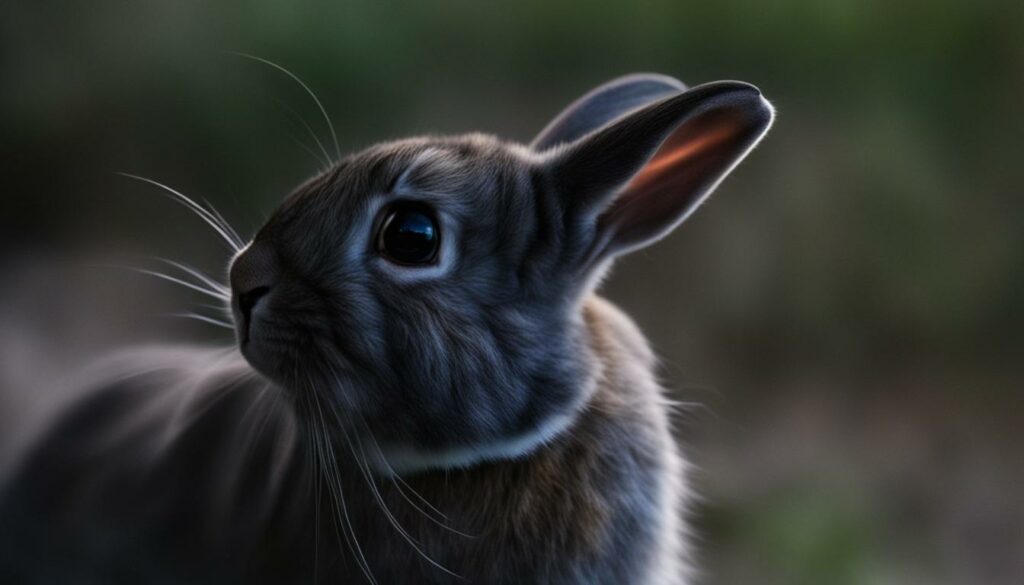
Table: Common Signs of Chronic Stress in Rabbits
| Behavioral Signs | Physical Signs |
|---|---|
|
|
By addressing the underlying causes of chronic stress and implementing appropriate solutions, rabbit owners can help their furry companions lead happier and healthier lives.
Shaking Caused by Ear Infections and Lop-Eared Rabbits
Ear infections can be a common cause of shaking in rabbits, particularly in lop-eared breeds. Lop-eared rabbits are more susceptible to developing ear infections due to their unique anatomy, which can make it easier for bacteria or other pathogens to enter the ear canal.
The symptoms of an ear infection in rabbits may include head shaking, scratching at the affected ear, and tilting the head to one side. If you notice these signs in your rabbit, it is important to seek veterinary treatment promptly. Untreated ear infections can lead to further complications, including severe pain and even hearing loss.
To diagnose and treat an ear infection, a veterinarian will examine the rabbit’s ear canal and may take a sample for laboratory analysis. Treatment typically involves cleaning the ear and administering appropriate medications, such as antibiotics or antifungal drugs, depending on the cause of the infection.
| Signs of Ear Infections in Rabbits: | Treatment: |
|---|---|
| Head shaking | Cleaning the ear and administering medication |
| Scratching at the affected ear | Follow-up veterinary care and monitoring |
| Tilting the head to one side | Preventing future ear infections through regular ear hygiene |
Preventing ear infections in lop-eared rabbits can be challenging but is possible with proper care. Regularly inspecting the ears for signs of infection, keeping the ears dry, and avoiding excess moisture and debris can help reduce the risk of ear infections. If you have a lop-eared rabbit, it is essential to establish a regular ear cleaning routine to maintain their ear health.
Remember, if your rabbit is shaking due to an ear infection or any other health concern, consulting with a veterinarian is crucial for accurate diagnosis and appropriate treatment. Your veterinarian can guide you in providing the best care for your rabbit’s specific needs and help ensure their well-being.
References:
- “Ear Infections (Otitis Media) and Otitis Interna in Rabbits,” VCA Hospitals, https://vcahospitals.com/know-your-pet/ear-infections-otitis-media-and-otitis-interna-in-rabbits
- “Lop Rabbits: All About Lop Bunny Breeds,” Small Pet Select, https://smallpetselect.com/lop-rabbits-all-about-lop-bunny-breeds/
Rabbit Shaking Due to Gastrointestinal (GI) Stasis: A Serious Health Issue
Gastrointestinal (GI) stasis is a serious health issue that can cause rabbits to shake. GI stasis occurs when the normal movement of food through the digestive system slows down or stops completely. This can lead to a buildup of gas and a decrease in appetite, resulting in shaking and other symptoms.
Common symptoms of GI stasis in rabbits include shaking, shivering, lying on the side, and loss of appetite. It is important to note that GI stasis is a medical emergency and requires immediate veterinary intervention. Delaying treatment can lead to further complications and even death.
The exact cause of GI stasis can vary, but it is often related to a poor diet that lacks fiber or is high in carbohydrates. Stress, dehydration, dental problems, and underlying medical conditions can also contribute to the development of GI stasis. To prevent GI stasis, it is essential to provide rabbits with a balanced diet that includes plenty of hay, fresh vegetables, and limited amounts of pellets.
If you suspect your rabbit may be experiencing GI stasis, it is crucial to seek veterinary help as soon as possible. Your veterinarian will be able to diagnose the condition and recommend the appropriate treatment, which may include medication, fluid therapy, and dietary changes. With prompt and proper care, rabbits with GI stasis can recover and resume a healthy, active life.
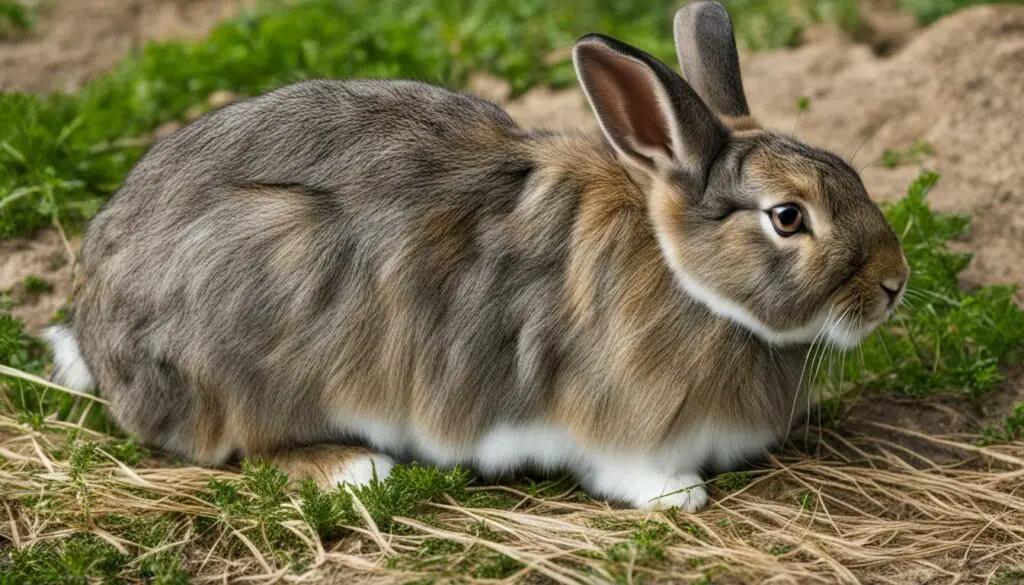
Table: Symptoms of GI Stasis in Rabbits
| Symptoms | Description |
|---|---|
| Shaking | Rabbit exhibits trembling or shivering movements |
| Shivering | Rabbit experiences involuntary shaking or tremors |
| Lying on the side | Rabbit adopts a stretched-out position on its side |
| Loss of appetite | Rabbit shows a decreased interest in food and may stop eating altogether |
Poisoning and Seizures: Dangerous Causes of Rabbit Shaking
When it comes to a rabbit shaking, there are certain causes that can be particularly dangerous. Poisoning and seizures are two such causes that require immediate attention. Rabbits are curious creatures, and their tendency to explore their environment can put them at risk of ingesting toxic plants, substances, or medications. These can lead to poisoning, which manifests as shaking and seizures in rabbits.
Seizures can also occur in rabbits as a result of underlying health issues or epilepsy. These sudden and uncontrollable episodes of shaking can be frightening for both the rabbit and its owner. It is crucial to seek veterinary attention promptly if a rabbit experiences shaking and seizures, as these can be life-threatening situations.
In order to prevent poisoning and seizures, it is important to ensure that the rabbit’s environment is free from toxic substances and plants. Additionally, keeping medications securely stored and out of reach of rabbits can help prevent accidental ingestion. Regular veterinary check-ups can also help identify any underlying health conditions that may increase the risk of seizures.
Table: Symptoms of Rabbit Poisoning
| Poisoning Type | Symptoms |
|---|---|
| Plant Poisoning | Shaking, seizures, vomiting, diarrhea, drooling |
| Medication Poisoning | Shaking, seizures, increased heart rate, difficulty breathing |
| Chemical Poisoning | Shaking, seizures, weakness, loss of appetite |

Conclusion:
Poisoning and seizures are serious causes of rabbit shaking that require immediate veterinary attention. It is important for rabbit owners to be vigilant in creating a safe environment for their furry companions by removing potential sources of poisoning. Regular check-ups and consultations with a veterinarian can help prevent and detect any underlying health conditions that may increase the risk of seizures. By being aware of these dangers and taking proactive measures, rabbit owners can provide the best care and ensure the well-being of their beloved pets.
When to Seek Veterinary Help for Rabbit Shaking
If you notice your rabbit shaking, it’s important to pay attention to their behavior and determine if it’s a cause for concern. Not all shaking is abnormal, as rabbits may exhibit different types of shaking that are considered normal behaviors. However, there are instances when shaking can indicate underlying health issues and require veterinary attention. Here are some guidelines to help you understand when to seek veterinary help for rabbit shaking.
Abnormal Shaking
Abnormal shaking in rabbits includes violent shaking, convulsions, disorientation, and other abnormal behaviors. If your rabbit is experiencing any of these symptoms, it is crucial to seek immediate veterinary attention. These signs may indicate a serious health issue that requires prompt diagnosis and treatment. Remember, it’s always better to err on the side of caution and consult a veterinarian when in doubt or worried about your rabbit’s health.
Changes in Behavior
In addition to shaking, it’s essential to observe any changes in your rabbit’s behavior. If your rabbit is displaying other abnormal behaviors such as loss of appetite, lethargy, difficulty breathing, or unusual posture, these could be signs of an underlying health problem. Monitoring your rabbit’s behavior and noting any changes can provide valuable information for your veterinarian.
When in Doubt, Consult a Veterinarian
If you are unsure whether your rabbit’s shaking is a cause for concern, it is always recommended to consult a veterinarian. They can assess your rabbit’s overall health and provide guidance on the next steps to take. Regular veterinary check-ups are essential for maintaining your rabbit’s well-being, and any concerns or questions you have should be addressed by a professional.
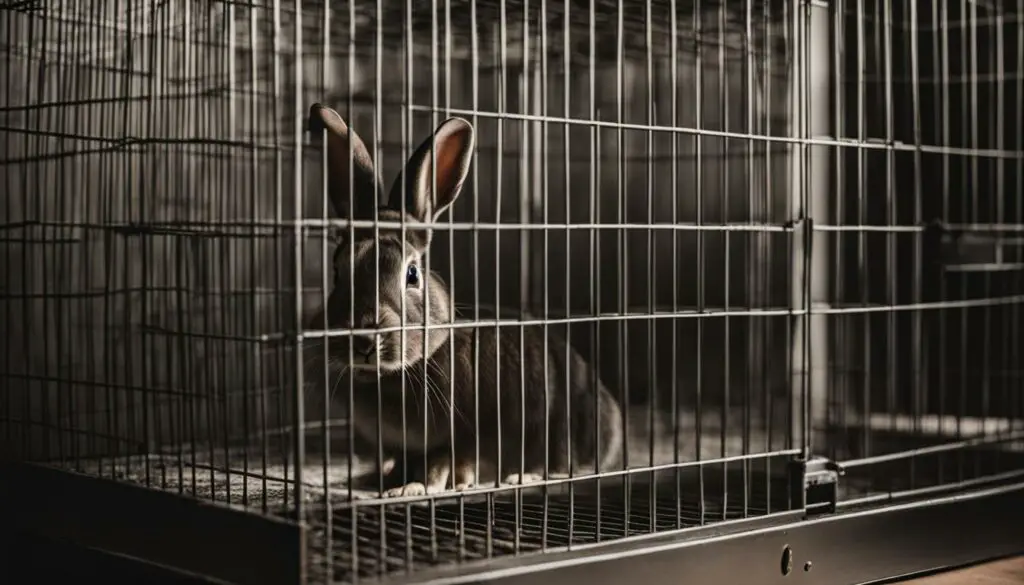
| Signs of Concern | Reasons to Seek Veterinary Help |
|---|---|
| Violent shaking or convulsions | Could indicate a serious health issue |
| Disorientation or unusual behaviors | May require prompt diagnosis and treatment |
| Loss of appetite or lethargy | Could be signs of an underlying health problem |
Remember, as a responsible pet owner, it’s crucial to prioritize your rabbit’s health and well-being. By being attentive to their behavior and seeking veterinary help when needed, you can ensure they receive the appropriate care and treatment.
Conclusion
In conclusion, understanding why your rabbit shakes is crucial for their overall well-being and health. Shaking can be a normal behavior, such as trembling, rippling skin, or twitching, which are commonly observed in rabbits and do not warrant concern. However, convulsing or violent shaking is a serious issue that requires immediate veterinary attention.
There are various reasons why rabbits shake, including fear and startling, anger, temperature fluctuations, ear problems, chronic stress, gastrointestinal stasis, poisoning, and seizures. It is essential to be aware of these potential causes and their accompanying symptoms to address any underlying health issues promptly.
Should you notice abnormal shaking, such as convulsions, disorientation, or other concerning behaviors, it is best to seek veterinary help without delay. Your veterinarian will be able to provide the necessary diagnosis and treatment to ensure your rabbit’s well-being. Remember, when in doubt or worried about your rabbit’s shaking, always consult a professional for guidance.
FAQ
Why is my rabbit shaking?
There are several reasons why rabbits shake, including normal behaviors like trembling, rippling skin, and twitching. However, shaking can also be a sign of underlying health issues or other concerns.
What are the types of shaking in rabbits?
The types of shaking in rabbits include trembling, rippling skin, twitching, and convulsing. While trembling, rippling skin, and twitching are normal rabbit behaviors, convulsing is not and requires immediate veterinary attention.
What are the normal reasons why rabbits shake?
Some normal reasons why rabbits shake include sleep twitches, happy shakes, and hiccuping. These behaviors are considered normal and usually harmless.
Why do rabbits shake due to fear and startling?
Rabbits may shake when they are frightened by sudden loud noises or movements. This fear-induced shaking is accompanied by fast and erratic breathing, a stiffened body, and ears. The shaking will subside once the rabbit feels safe or finds a secure hiding place.
Why do rabbits shake and thump their feet when they are angry?
Rabbits may shake and thump their hind feet when they are angry. It is important to leave an angry rabbit alone to avoid being bitten. Recognizing signs of anger in rabbits is crucial for their well-being.
How does temperature affect rabbit shaking?
Rabbits may shiver if they are too cold, while overheating can lead to heatstroke. It is necessary to monitor a rabbit’s environment to prevent heatstroke, as rabbits do better in cool weather and are at risk of overheating due to their warm fur coats.
Why do rabbits shake due to ear problems?
Head shaking in rabbits may indicate ear mites, fleas, lice, or ear infections. Symptoms of ear problems in rabbits include frequent head shaking, scratching, and tilting of the head. Ear problems require veterinary attention and proper treatment.
How does chronic stress affect rabbit shaking?
Chronic stress can cause rabbits to crouch in a corner, tremble, and exhibit aggressive behavior. Removing stressors and providing a calm environment can help rabbits cope with chronic stress.
Why do lop-eared rabbits have a higher risk of ear infections?
Lop-eared rabbits are more susceptible to ear infections due to their anatomy. Symptoms of ear infections in rabbits include head shaking, scratching, and tilting of the head. Ear infections require veterinary treatment to prevent complications.
Why do rabbits shake due to gastrointestinal (GI) stasis?
GI stasis is a life-threatening condition in rabbits caused by a poor diet or other factors. Symptoms of GI stasis include shaking, shivering, lying on the side, and loss of appetite. Immediate veterinary intervention is necessary to treat GI stasis.
What can cause poisoning and seizures in rabbits?
Poisoning from toxic plants, substances, or medications can cause shaking and seizures in rabbits. Seizures can also be a result of underlying health issues or epilepsy in rabbits. Immediate veterinary attention is required for poisoning and seizures.
When should I seek veterinary help for rabbit shaking?
Recognizing the signs and body language of a shaking rabbit can help determine when veterinary help is needed. Symptoms such as violent shaking, convulsions, disorientation, and other abnormal behaviors require immediate veterinary attention. When in doubt or worried, it is best to consult a veterinarian.
Conclusion
Understanding why a rabbit shakes is important for their proper care and health monitoring. Shaking can be a normal behavior or a sign of underlying health issues. By observing a rabbit’s body language and recognizing abnormal shaking, owners can provide the necessary care and seek veterinary help when needed.
Source Links
- https://www.rabbitcaretips.com/rabbit-shaking-and-trembling/
- https://www.hepper.com/why-is-my-rabbit-shaking/
- https://www.fuzzy-rabbit.com/why-is-my-bunny-shaking/








